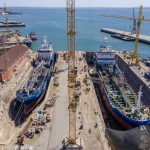Government approves Golden Visa constraints
New constraints on where and how overseas applicants can apply for a Golden Visa in Portugal were approved by the Council of Ministers on Tuesday.
The limitations on Lisbon and Porto had already been agreed in principle as part of the State Budget for 2020 through legislative authorisation, and restrictions include not only Lisbon and Porto but also the Algarve coast.
The Government has approved these restrictions because it wants to channel overseas investment away from the main centres — which have attracted applicants so far and who have overwhelmingly opted for the property option to get the visa — in favour of other regions in the country with a lower population density such as the interior of the country.
However, since most applicants want to ensure their investment in the main two cities and the Algarve, it may well spell the end of the Authorisation for Residency through Investment (ARI) which since it was started 8 years ago, in November 2012, has brought in over €5Bn in investment.
A statement from the Council of Ministers said, “The Decree-law which alters the legal regime for the authorisations of residency for investment whose objective is (now) to promote overseas investment in low population density areas, namely in urban regeneration, in cultural heritage and activities that have a high environmental or social value, productive investment and employment creation, has been approved.”
The measure, which has now been approved, will only come into force from July 2020 to enable a period or transition and adaptation. “This regime foresees a provisional period during the year 2021 and 2022, reducing the possibility of investments to be applied in the metropolitan areas, while increasing the value of these investments, and which will come into force on the 1 July 2021” said the Minister for the Presidency, Mariana Vieira da Silva.
The change in the law is being justified on the grounds of the “change in context” which the country is currently going through compared to 2012 when the regime was created.
The granting of Authorisation for Residency through Investment (ARI) to overseas citizens is made through undertaking various types of investment such as capital transfer, creating jobs or investment in real estate over €500,000, which will be maintained, but will nw be restricted to municipal areas in the interior and the autonomous regions of Madeira and the Azores.
Various associations and groups within the Portuguese real estate sector have shown concern over this new measure, which they are against, fearing that it could spell the end of the programme which has done so much to inject new life and investment into Portugal’s main two cities by paving the way for old and run down city centre properties to be done up as homes and properties to rent for tourists.
These associations question the wisdom of the new restrictions and doubt if overseas investors will want to invest in properties in Portugal’s secondary cities and the interior, and fear that these same investors will simply opt not to invest in Portugal and will, instead, choose to invest in other jurisdictions overseas which offer better and alternative options such as Greece, Cyprus, Spain and Malta, all of which operate alternative Golden Visa type programmes.










